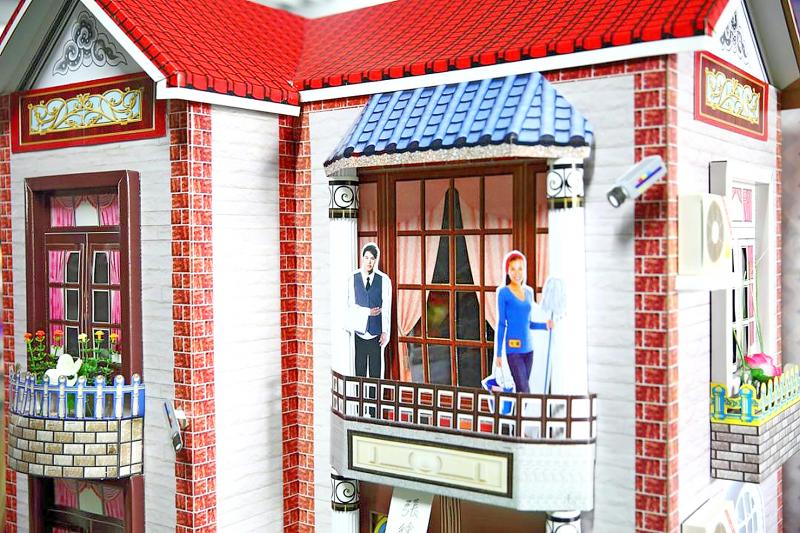Yang Hsien-chang (楊憲璋) is the third-generation head of his family’s traditional zhizha (紙紮) workshop in Kaohsiung.
Zhizha is the craft of making models of worldly goods to be given to the underworld, either to placate ghosts or so ancestors can have a better afterlife.
Yang said he originally wanted to be a pastry chef, but he had grown up watching zhizha being made.

Photo: Lee Hui-chou, Taipei Times
“Later on, worried that the art of zhizha would die out, I decided to take up the family trade,” said Yang, who has been in the business for more than two decades and has created all types of figures and buildings.
Any products that require shaping, regardless of the recipient — Taoist of Buddhist deities, ancestors, or the spirits “released” from the underworld on the seventh month of the lunar calendar — is made by a zhizha artisan, he said.
“It is a traditional handicraft that helps bridge the living and the dead, using the items to convey the memories of the deceased by the living to those who have passed,” Yang said.
Most clients want to give “the absolute best” to the deceased, whether that means a house, a car, or in modern times, popular electronic products, such as the newest cellphones or household appliances, Yang said.
“Some have requested that I make an entire sanheyuan (三合院, a traditional three-side courtyard building), or the newest model of a Tesla,” he said.
Asked what request had made the greatest impression, Yang said it was one for human organs.
“It could be that the deceased had passed from disease or an accident that caused them to lack an organ,” Yang said, adding that it was a token of the client’s goodwill that they wished to make the deceased whole in the afterlife.
Yang said his workshop could meet any request, with the only difference being the quality of the product and the time required to make it.
On average, the workshop can produce a model of a house, or a mansion, within five to seven days, but if the client requests a more detailed house, the project would require at least 10 days, Yang said.
The price range is based on the level of customization, with the going rate for houses starting at NT$10,000 to NT$20,000, and going up to NT$100,000 depending on the level of detail and the furnishings, Yang said.
Other items, such as scooters, vehicles and electronic products, cost between NT$3,000 and NT$5,000, with more detailed vehicles, such as Harley-Davidson motorcycles, going for NT$100,000 per item, Yang said.
While the workshop has been upgraded with modern technology and Yang has made some modifications to streamline production, “it is just different to make things by hand. It truly reflects the sincerity of the individual making the offering, as well as the craftsman,” he said.
Like all traditional handicrafts, especially as zhizha are offered to the dead, there are certain rituals to observe, such as houses that must always be paired with servants and be accompanied with a “deed” with the name of the recipient written on it.
“It is like real-estate purchases in real life, you have to include the land for them to have the house on,” Yang said.

The Grand Hotel Taipei on Saturday confirmed that its information system had been illegally accessed and expressed its deepest apologies for the concern it has caused its customers, adding that the issue is being investigated by the Ministry of Justice Investigation Bureau. The hotel said that on Tuesday last week, it had discovered an external illegal intrusion into its information system. An initial digital forensic investigation confirmed that parts of the system had been accessed, it said, adding that the possibility that some customer data were stolen and leaked could not be ruled out. The actual scope and content of the affected data

DO THEY BITE IT? Cats have better memories than people might think, but their motivation is based entirely around the chance of getting fed Cats can remember the identity of the people who fed them the day before, Taipei-based veterinarians said on Friday, debunking a popular myth that cats have a short memory. If a stray does not recognize the person who fed them the previous day, it is likely because they are not carrying food and the cat has no reason to recognize them, said Wu Chou Animal Hospital head Chen Chen-huan (陳震寰). “When cats come to a human bearing food, it is coming for the food, not the person,” he said. “The food is the key.” Since the cat’s attention is on the food, it

A New York-based NGO has launched a global initiative to rename the nation’s overseas missions, most of which operate under the name "Taipei," to "Taiwan Representative Office (TRO)," according to a news release. Ming Chiang (江明信), CEO of Hello Taiwan, announced the campaign at a news conference in Berlin on Monday, coinciding with the World Forum held from Monday through Wednesday, the institution stated in the release. Speaking at the event, Democratic Progressive Party Legislator Huang Jie (黃捷) said she believed this renaming campaign would enable the international community to see Taiwan

TOO DANGEROUS: The families agreed to suspend crewed recovery efforts that could put rescuers in danger from volcanic gases and unstable terrain The bodies of two Taiwanese tourists and a Japanese pilot have been located inside a volcanic crater, Japanese authorities said yesterday, nearly a month after a sightseeing helicopter crashed during a flight over southwestern Japan. Drone footage taken at the site showed three bodies near the wreckage of the aircraft inside a crater on Mount Aso in Kumamoto Prefecture, police and fire officials said. The helicopter went missing on Jan. 20 and was later found on a steep slope inside the Nakadake No. 1 Crater, about 50m below the rim. Authorities said that conditions at the site made survival highly unlikely, and ruled